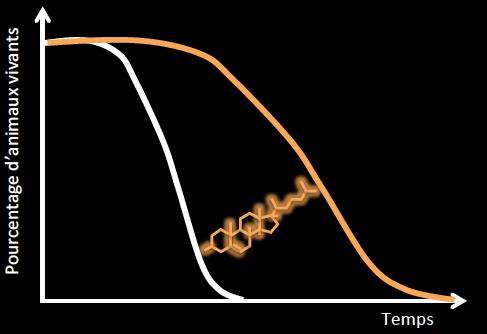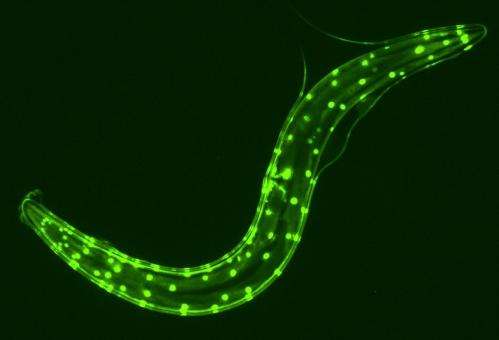Steroid hormone to fight age-related diseases

Through the study of the roundworm, Caenorhabditis elegans, the team led by Hugo Aguilaniu has discovered a hormone that enhances longevity and reduces fertility, thus reproducing the effects of an extreme diet. The scientists, based at the "Laboratoire de Biologie Moléculaire de la Cellule" (LBMC - CNRS/ENS de Lyon/Université Claude Bernard Lyon 1), now intend to explore its mode of action in the hope of finding new ways to combat age-related diseases. Their work is published on 11 September in Nature Communications.
Eating less prolongs the lifespan of a large number of species, from yeasts to primates to spiders and cats. It is also known that drastic calorie restriction reduces the incidence of age-related conditions (such as cancers, neurodegenerative diseases and muscle loss). This has been demonstrated in rodents and large monkeys, and it is likely that the same applies in humans.. However, such extreme diets (bordering on malnutrition) are difficult to maintain, notably because of their side effects, which are both psychological (irritability, impaired libido) and physiological (reduced fertility). For health reasons, these diets are therefore not recommended.
In the C. elegans roundworm, Hugo Aguilaniu and his team have identified a hormone that is produced in response to dietary restriction. This hormone, called dafachronic acid, is required to extend lifespan and is also involved in diet-related loss of fertility. This discovery thus establishes a direct link between increased lifespan and decreased reproductive capacity in the context of a low-calorie diet.
The researchers have also discovered the receptor through which dafachronic acid exerts its action in cell nuclei. As the "conductor of the orchestra", its presence can activate a large number of genes. In this "genetic symphony", some genes will induce a reduction in fertility while others will slow down the ageing process.

Hugo Aguilaniu now hopes to be able to dissociate these two types of response in order to artificially trigger the hormone's protective effect against age-related diseases, without causing harmful side effects. This may open the way towards therapeutic applications, as the hormone thus identified, and its receptor, have close relatives in mammals and humans.
More information: "Steroid hormone signaling links reproduction to lifespan in dietary-restricted Caenorhabditis elegans," M. Thondamal, M. Witting, P. Schmitt-Kopplin & H. Aguilaniu. Nature Communications, 11 September 2014.
















